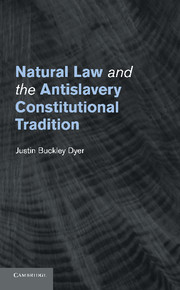
- Cited by 3
-
Cited byCrossref Citations
This Book has been cited by the following publications. This list is generated based on data provided by Crossref.
Bickersteth, Bertrand 2015. Bordering on African American: Wayde Compton and the Readability of Blackness. University of Toronto Quarterly, Vol. 84, Issue. 1, p. 55.
Cash, Jordan 2021. “A purer form of government”: African American constitutionalism in the founding of Liberia. Journal of Transatlantic Studies, Vol. 19, Issue. 4, p. 408.
T. Cash, Jordan 2022. The Constitutional Agency of the Vice Presidency. Congress & the Presidency, Vol. 49, Issue. 3, p. 329.
- Publisher:
- Cambridge University Press
- Online publication date:
- March 2012
- Print publication year:
- 2012
- Online ISBN:
- 9781139005074




